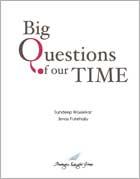The decline of the West
|
|
October 18, 2016
By Dr. Frank Cibulka
|
My main concern is the increasing anarchy in the international system since the end of Cold War and the decline of the sovereign power of the states. Combined with the decline of the West, meaning the United States and Europe in particular, this will precipitate the loss of the universal values enshrined in the past century and open the way for the increased power of organized crime and international terrorism, as well as for catastrophic ecological decline in many areas of our planet.
The decline of the West has been predicted by many from Oswald Spengler to Singapore’s Kishore Mahbubani. I myself considered a gradual decline of the West inevitable and perhaps not harmful if accompanied by an equally moderate political and economic rise of select areas of the world, including China and India.
However, the United States and Europe are declining sharply and due to different maladies. The United States, suffering from inexperienced political leadership and exhibiting either error-prone or indecisive foreign policy, is plagued at home by constitutional paralysis of governance, mainly brought about by the Talibanization of right-wing segments of the Republican Party.
At the same time, the persistence of the crushing national debt and impact of economic globalization steadily reduce its economic self-reliance, erode the status of its working class, and reduce its piece of the pie in the world economy.
The European Union, now encompassing the vast majority of countries on the European continent, has seen its economic growth and solidarity reversed by a single-minded federalist orientation of its increasingly bureaucratized political elites, whose views on issues such as immigration are completely inconsistent with those of the majority of populations in individual countries.
The governing elite’s major errors in implementing the common currency and particularly the failure to properly manage the Greek accession to the Eurozone, along with its current inability to prevent, control or manage the massive flow of African, Middle Eastern and West Asian migrants onto the continent, have opened up serious fissures in the process of European integration, in the long run endangering its survival.
The very values a social cohesion of European nations are placed under threat by the massive influx of migrants, many of them economic migrants and not political refugees, from countries whose societal and religious values are incompatible with those of most European Union’s countries. While European nations need a measure of cooperation and integration to safeguard peace on the continent, relentless calls for “more Europe” as a solution to European Union’s failures further alienate many Europe’s citizens.
The European Union’s leaders claim credit for preserving peace on the continent for seventy years since the end of the World War II. But much credit for that peace goes to the fears and realities of the Cold War when the fear of the Soviet Union’s aggression or of nuclear annihilation forced various countries to accept the straightjacket of the superpower alliance systems, and this forced order also extended into parts of the Third World. Proxy wars, such as in Afghanistan and Angola, were the exceptions to the rule.
With the world no longer divided into major alliance systems, peace rapidly ended as became evident within few years in the bloody civil war in Yugoslavia. The concept of New World Order, dusted off and embraced by President George H.W. Bush, has twenty-five years later given way to the largest number of international conflicts since the end of World War II.
This situation is seen also in the decreasing ability of international organizations, including the United Nations, to positively influence global and regional events. The decline in power and influence of the West, not yet filled by the rise to leadership from the Third World, has resulted in the realization that the 20th-century idea of the progress of mankind, ascribed to scientific-technological discovery and institutions of universal humanitarian values, must be reassessed.
Our world has become one of spilled blood and raging fires of madly proliferating civil wars and religious conflict; it has become a world of renewed slaughter of elephants and other endangered wildlife and increased destruction of forests; it has become a place where the world seemingly shrinking due to globalization has become vulnerable to more deeply penetrating organizing crime, including cyber-crime and potential for nuclear terrorism. It has become a world of growing anarchy which feeds on the decline of the power of the West and on the erosion of sovereignty of states. And that is the troubled vision I have for the rest of the 21st century.
This article is part of the SFG publication “Big Questions of Our time: The World Speaks”.
To access the full publication please click here.
Related Publications
-
.jpg&maxw=50)
Big Questions of Our time: The World Speaks, 2016
Download:Big Questions of Our time: The World Speaks _Full Report
-

-

Second Freedom South Asian Challenge 2005-2025, 2005
read more
Download:Second Freedom South Asian Challenge 2005-2025 Full Report
Related latest News
Related Conferences Reports
-

Global Challenges Conference, October 2016
Download:Global Challenges Conference Report
-

Conference on Responsibility to the Future: Business, Peace and Sustainability, June, 2008
Download:Global Security and Economy: Emerging Issues


